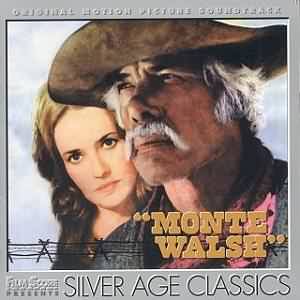
There appear to be two main schools of thought when it comes to producing
a soundtrack album. The first is to make an entertaining disc which stands
alone irrespective of the film, the second to produce what is effectively
an archival document, including as much music from the film as possible.
This enterprising release, part of Film Score Monthly's series of Silver
Age Classics, attempts to combine both approaches. Thus the first 14 tracks,
play like a normal soundtrack album, presenting the best of John Barry's
score almost in the order it appears in the film. A note explains that -
'a complete chronological album would be terribly redundant and would sap
this beautiful music of most of its power'. The second half of the disc consists
of source music, outtakes, and alternative recordings of the title song.
The approach works well, offering a conventional uninterrupted John Barry
album, with the bonus material (which is unlikely to be played as often)
presented separately. The booklet, with notes on the film by Pete Walker
and Geoff Leonard, and on the music by Lukas Kendall, is likewise a model
of presentation.
Monte Walsh was a 1970 western (based on a novel by the author of
Shane), starred Lee Marvin, Jeanne Moreau and Jack Palance and was
directed by William A. Fraker. The film, which is generally considered to
be either a depressing bore, or a beautiful elegy to the dying of the West
(and the western), had limited release and was a commercial failure. No
soundtrack LP was ever issued, making this limited edition CD the first
legitimate issue of what has come to be considered by John Barry fans, a
lost classic.
The album opens with the song 'The Good Times are Comin', a deceptively
optimistic number sung by Mama Cass (Elliot) of the Mamas and the Papas pop
group. Barry wrote the song with lyricist Hal David (with whom he also co-wrote
Moonraker and 'We Have all the Time in the World' from On Her Majesty's
Secret Service), and while it is an appealing number, it is not one of
Barry's best songs. The score itself is stronger, as is built around four
basic themes. The first is an instrumental version of the title song, then
there is an attractive love theme, a playful comedy theme and a rather more
sombre and poetic melody to portray the melancholy "loss" which features
so much in the film. There is little action, but when it arrives in Sit Him
High it prefigures the dark foreboding the composer would bring to his much
under-rated score for the 1976 remake of King Kong. The melodies are accomplished
and well crafted and the sound is fairly good - though in mono, a fact about
which the packaging is reticent. I am sure it all works very well with the
film and it makes for an enjoyable CD, but it is a little too low key to
be considered really essential Barry when taken out of context.
The bonus material consists of two more versions of the song (there are also
two other versions besides the main title in the film itself), an 'Extended
Version' and a 'Single Version' - the only track in on the disc in stereo.
If only for the improved sound quality, this version is the most enjoyable.
14 minutes and 48 seconds are devoted to The John Barry Saloon, 6 source
pieces of jangly and repetitive saloon piano music, which I doubt any but
the most dedicated Barry fan will listen to for long. The 'Score Outtakes
Suite' is a single seven minute track not of material dropped from the film,
but left out of the first part if the album. It consists of mainly very short
arrangements of the four themes, and is nice to have but adds little to what
has gone before.
The conclusion has to be that this is a good, attractive score, which has
been immaculately presented. I rather doubt though, that had it not come
from such a popular and collectable composer as John Barry whether such pains
would have been taken to produce this disc. Certainly this must be considered
a definitive release, though ultimately it is an album for the Barry fan
who has everything else already
Reviewer
Gary S. Dalkin

www.filmscoremonthly.com

